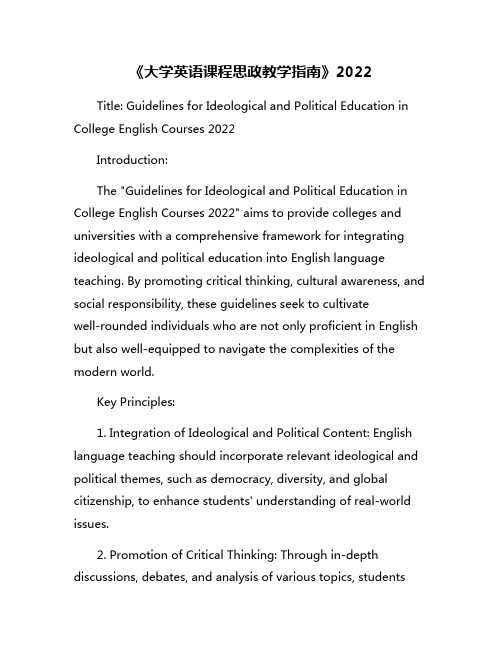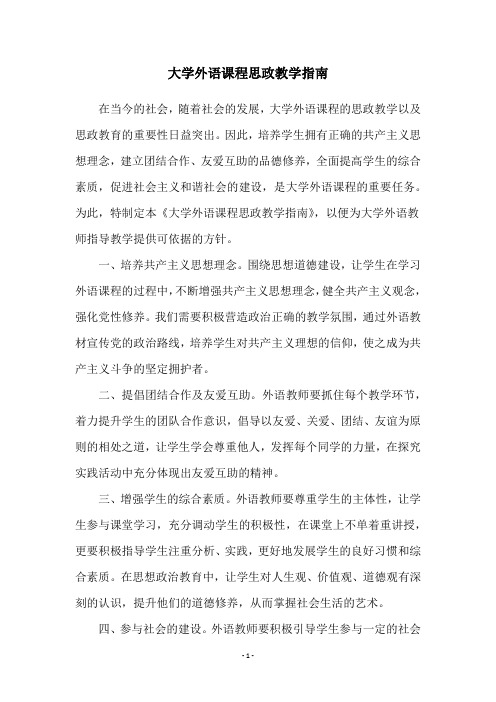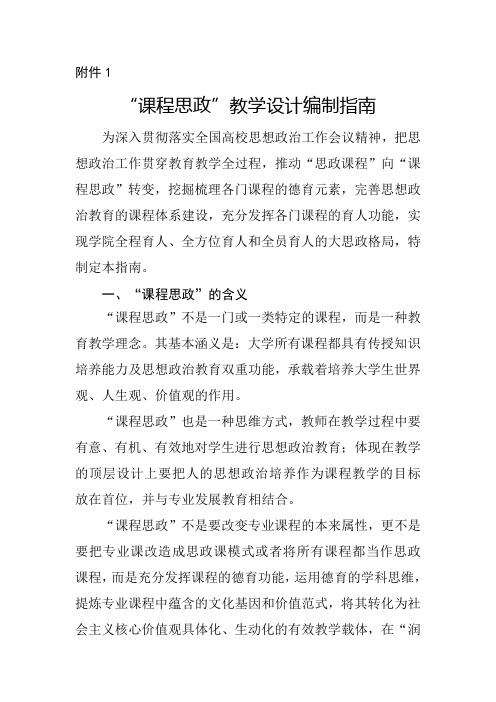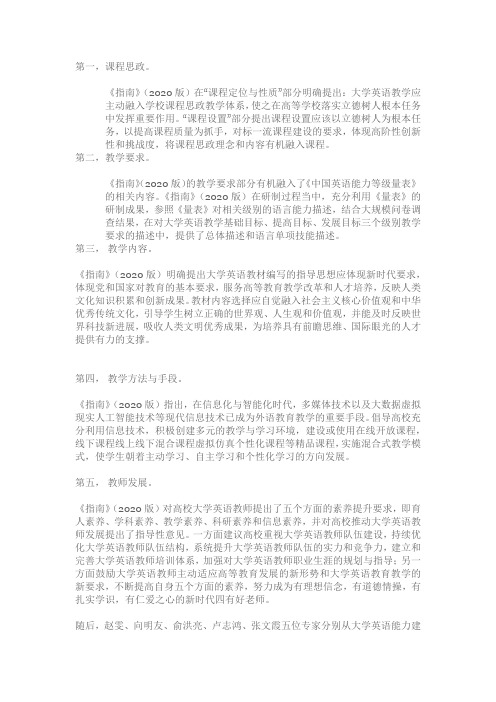高校课程思政指南
《大学英语课程思政教学指南》2022

《大学英语课程思政教学指南》2022Title: Guidelines for Ideological and Political Education in College English Courses 2022Introduction:The "Guidelines for Ideological and Political Education in College English Courses 2022" aims to provide colleges and universities with a comprehensive framework for integrating ideological and political education into English language teaching. By promoting critical thinking, cultural awareness, and social responsibility, these guidelines seek to cultivatewell-rounded individuals who are not only proficient in English but also well-equipped to navigate the complexities of the modern world.Key Principles:1. Integration of Ideological and Political Content: English language teaching should incorporate relevant ideological and political themes, such as democracy, diversity, and global citizenship, to enhance students' understanding of real-world issues.2. Promotion of Critical Thinking: Through in-depth discussions, debates, and analysis of various topics, studentsshould be encouraged to think critically and independently about complex social and political issues.3. Emphasis on Cultural Awareness: English language teaching should also focus on promoting cultural awareness and sensitivity, enabling students to appreciate and respect diverse cultures and perspectives.4. Cultivation of Social Responsibility: Students should be encouraged to actively engage in social and political discourse, advocating for positive change and contributing to the development of a harmonious society.Practical Guidelines:1. Curricular Design: English language courses should be designed to include a mix of language skills development and ideological and political content, ensuring a balanced approach to teaching.2. Teaching Strategies: Teachers should employ a variety of teaching strategies, such as group discussions, role-playing activities, and multimedia presentations, to facilitate students' understanding of ideological and political issues.3. Assessment Methods: Assessment methods should be designed to evaluate students' comprehension of both languageskills and ideological and political content, encouraging critical reflection and analysis.4. Extracurricular Activities: Colleges and universities should organize extracurricular activities, such as seminars, workshops, and community service projects, to further enhance students' understanding of ideological and political issues.Conclusion:The "Guidelines for Ideological and Political Education in College English Courses 2022" provides a framework for colleges and universities to integrate ideological and political education into English language teaching effectively. By promoting critical thinking, cultural awareness, and social responsibility, these guidelines aim to cultivate well-rounded individuals who are not only proficient in English but also equipped with the knowledge and skills to navigate the complexities of the modern world.。
大学英语课程思政教学指南教育部公布

大学英语课程思政教学指南教育部公布The Ministry of Education has recently released the "Guidelines for Moral and Political Education in College English Courses", providing a comprehensive framework for integrating moral and political education into college English teaching. This move is part of the government's efforts to promote the cultivation of well-rounded individuals who are not only proficient in language skills but also have a strong sense of social responsibility and ethical values.The guidelines emphasize the importance of incorporating ideological and moral education into English courses, in order to help students develop a deeper understanding of Chinese traditional culture, socialist core values, and the principles of a harmonious society. The aim is to nurture students' patriotic spirit, moral integrity, social responsibility, and critical thinking skills, while also enriching their understanding of global issues and promoting cross-cultural communication.One of the key principles outlined in the guidelines is the integration of moral and political education with language teaching, in order to create a holistic learning experience for students. This involves incorporating relevant themes, topics, and materials into the English curriculum, such as discussions onsocial justice, environmental protection, gender equality, and cultural diversity. Through these discussions, students are encouraged to reflect on their own values and beliefs, and to develop a more nuanced understanding of their role in society.The guidelines also stress the importance of fostering a positive classroom environment that encourages open dialogue, critical thinking, and mutual respect among students. Teachers are encouraged to create opportunities for students to engage in meaningful discussions, debates, and group activities that promote collaboration and teamwork. By creating a supportive and inclusive learning environment, teachers can help students develop essential skills such as empathy, tolerance, and communication, which are crucial for building a harmonious society.In addition, the guidelines highlight the importance of incorporating real-life examples, case studies, and current events into English lessons, in order to make the content more relevant and engaging for students. By exploring real-world issues and challenges, students can develop a deeper understanding of the complexities of the world around them, and learn how to apply their language skills to address important social issues.Overall, the "Guidelines for Moral and Political Education in College English Courses" provide a comprehensive framework for promoting the integration of moral and political education into college English teaching. By incorporating these principles into their teaching practices, educators can help students develop the knowledge, skills, and attitudes needed to become responsible citizens and global leaders in an increasingly complex and interconnected world.。
高职院校课程思政建设指南研究

高职院校课程思政建设指南研究在当前教育领域的发展中,思想政治理论课程的建设一直备受关注。
特别是在高职院校这个特殊的教育阶段,如何有效地进行课程思政建设成为了研究的重点。
本文将对高职院校课程思政建设指南进行深入探讨,探讨如何更好地指导和实施课程思政建设,提高学生的思想政治素养和综合素质。
引言:教育的目的在于培养学生成为德智体美劳全面发展的社会主义建设者和接班人。
高职院校作为培养技术技能型人才的重要阶段,其课程思政建设显得尤为重要。
缺乏思想政治教育的课程将导致学生成长过程中的道德观念偏差、人生目标偏移等问题,因此,如何在课程教学中融入思政教育,成为高职院校亟待解决的问题之一。
一、高职院校课程思政建设的现状分析高职院校课程思政建设存在的问题包括教学资源缺乏、教学内容陈旧、教学方法单一等。
当前,部分高职院校课程思政建设仍停留在传统的灌输式教学模式,缺乏针对学生思想特点和需求的有针对性教学。
二、高职院校课程思政建设指南的制定原则1. 关注学生需求:根据学生的身心发展特点和实际需求,确定课程思政建设的总体目标和基本要求。
2. 注重实践教学:通过案例分析、实地考察等形式,引导学生将课堂学到的知识运用到实际生活中,增强学生的思想政治素养。
3. 多元化教学方法:采用讨论式教学、小组合作学习等多元化教学方法,激发学生的学习兴趣,提高教学效果。
三、高职院校课程思政建设指南的实施策略1. 制定具体方案:根据学校实际情况,制定符合学校特点和学生需求的课程思政建设指南,并确定实施计划。
2. 教师队伍建设:加强教师思政教育培训,提高教师的教学水平和思政教育水平,确保课程思政建设的质量。
3. 加强评估监督:建立课程思政建设的评估体系,定期对课程思政建设的实施效果进行评估,及时发现问题并加以解决。
结语:高职院校课程思政建设是一项长期而系统的工程,需要全校师生共同努力。
通过制定科学的思政建设指南,加强教师队伍建设和评估监督,将课程思政建设工作落到实处,更好地为学生成长成才提供坚实的思想政治基础。
大学外语课程思政教学指南

大学外语课程思政教学指南在当今的社会,随着社会的发展,大学外语课程的思政教学以及思政教育的重要性日益突出。
因此,培养学生拥有正确的共产主义思想理念,建立团结合作、友爱互助的品德修养,全面提高学生的综合素质,促进社会主义和谐社会的建设,是大学外语课程的重要任务。
为此,特制定本《大学外语课程思政教学指南》,以便为大学外语教师指导教学提供可依据的方针。
一、培养共产主义思想理念。
围绕思想道德建设,让学生在学习外语课程的过程中,不断增强共产主义思想理念,健全共产主义观念,强化党性修养。
我们需要积极营造政治正确的教学氛围,通过外语教材宣传党的政治路线,培养学生对共产主义理想的信仰,使之成为共产主义斗争的坚定拥护者。
二、提倡团结合作及友爱互助。
外语教师要抓住每个教学环节,着力提升学生的团队合作意识,倡导以友爱、关爱、团结、友谊为原则的相处之道,让学生学会尊重他人,发挥每个同学的力量,在探究实践活动中充分体现出友爱互助的精神。
三、增强学生的综合素质。
外语教师要尊重学生的主体性,让学生参与课堂学习,充分调动学生的积极性,在课堂上不单着重讲授,更要积极指导学生注重分析、实践,更好地发展学生的良好习惯和综合素质。
在思想政治教育中,让学生对人生观、价值观、道德观有深刻的认识,提升他们的道德修养,从而掌握社会生活的艺术。
四、参与社会的建设。
外语教师要积极引导学生参与一定的社会实践活动,让学生深入到社会实践中去,增强他们的社会实践能力,努力帮助他们在实践中成长,在实践中学习,在实践中实现社会主义和谐社会的建设。
本《大学外语课程思政教学指南》的编制,旨在为大学外语教师的指导教学提供理论和指导依据,最终使学生在外语课堂中,受到更高质量的思想政治教育,树立共产主义理想信念,夯实共同的团结合作的友谊,同时对学生的综合素质有更大的提高,最终营造一个属于全体学生的和谐新时代。
课程思政教学设计编制指南

附件1“课程思政”教学设计编制指南为深入贯彻落实全国高校思想政治工作会议精神,把思想政治工作贯穿教育教学全过程,推动“思政课程”向“课程思政”转变,挖掘梳理各门课程的德育元素,完善思想政治教育的课程体系建设,充分发挥各门课程的育人功能,实现学院全程育人、全方位育人和全员育人的大思政格局,特制定本指南。
一、“课程思政”的含义“课程思政”不是一门或一类特定的课程,而是一种教育教学理念。
其基本涵义是:大学所有课程都具有传授知识培养能力及思想政治教育双重功能,承载着培养大学生世界观、人生观、价值观的作用。
“课程思政”也是一种思维方式,教师在教学过程中要有意、有机、有效地对学生进行思想政治教育;体现在教学的顶层设计上要把人的思想政治培养作为课程教学的目标放在首位,并与专业发展教育相结合。
“课程思政”不是要改变专业课程的本来属性,更不是要把专业课改造成思政课模式或者将所有课程都当作思政课程,而是充分发挥课程的德育功能,运用德育的学科思维,提炼专业课程中蕴含的文化基因和价值范式,将其转化为社会主义核心价值观具体化、生动化的有效教学载体,在“润物细无声”的知识学习中融入理想信念层面的精神指引。
二、“课程思政”的目标以习近平新时代中国特色社会主义思想为指导,坚持知识传授与价值引领相结合,运用可以培养大学生理想信念、价值取向、政治信仰、社会责任的题材与内容,全面提高大学生缘事析理、明辨是非的能力,让学生成为德才兼备、全面发展的人才。
三、“课程思政”的内容围绕“课程思政”目标,通过积极培育和践行社会主义核心价值观,运用马克思主义方法论,引导学生正确做人和做事,各教学科目和教育活动,应结合以下内容进行教学设计。
(一)师德风范学高为师,身正为范。
“教师是人类灵魂的工程师,承担着神圣使命。
传道者自己首先要明道、信道。
高校教师要坚持教育者先受教育,努力成为先进思想文化的传播者、党执政的坚定支持者,更好担起学生健康成长指导者和引路人的责任。
《指南》(2020版)

第一,课程思政。
《指南》(2020版)在“课程定位与性质”部分明确提出:大学英语教学应主动融入学校课程思政教学体系,使之在高等学校落实立德树人根本任务中发挥重要作用。
“课程设置”部分提出课程设置应该以立德树人为根本任务,以提高课程质量为抓手,对标一流课程建设的要求,体现高阶性创新性和挑战度,将课程思政理念和内容有机融入课程。
第二,教学要求。
(2020版)的教学要求部分有机融入了《中国英语能力等级量表》《指南》的相关内容。
《指南》(2020版)在研制过程当中,充分利用《量表》的研制成果,参照《量表》对相关级别的语言能力描述,结合大规模问卷调查结果,在对大学英语教学基础目标、提高目标、发展目标三个级别教学要求的描述中,提供了总体描述和语言单项技能描述。
第三,教学内容。
《指南》(2020版)明确提出大学英语教材编写的指导思想应体现新时代要求,体现党和国家对教育的基本要求,服务高等教育教学改革和人才培养,反映人类文化知识积累和创新成果。
教材内容选择应自觉融入社会主义核心价值观和中华优秀传统文化,引导学生树立正确的世界观、人生观和价值观,并能及时反映世界科技新进展,吸收人类文明优秀成果,为培养具有前瞻思维、国际眼光的人才提供有力的支撑。
第四,教学方法与手段。
《指南》(2020版)指出,在信息化与智能化时代,多媒体技术以及大数据虚拟现实人工智能技术等现代信息技术已成为外语教育教学的重要手段。
倡导高校充分利用信息技术,积极创建多元的教学与学习环境,建设或使用在线开放课程,线下课程线上线下混合课程虚拟仿真个性化课程等精品课程,实施混合式教学模式,使学生朝着主动学习、自主学习和个性化学习的方向发展。
第五,教师发展。
《指南》(2020版)对高校大学英语教师提出了五个方面的素养提升要求,即育人素养、学科素养、教学素养、科研素养和信息素养,并对高校推动大学英语教师发展提出了指导性意见。
一方面建议高校重视大学英语教师队伍建设,持续优化大学英语教师队伍结构,系统提升大学英语教师队伍的实力和竞争力,建立和完善大学英语教师培训体系,加强对大学英语教师职业生涯的规划与指导;另一方面鼓励大学英语教师主动适应高等教育发展的新形势和大学英语教育教学的新要求,不断提高自身五个方面的素养,努力成为有理想信念,有道德情操,有扎实学识,有仁爱之心的新时代四有好老师。
大学英语课程思政教学指南教育部公布
大学英语课程思政教学指南教育部公布The teaching of college English courses with ideological and political content is an important task for higher education institutions in China. It aims to cultivate students' correct world outlook, outlook on life, and values, and to help them establish a correct view of history, nation, state, and culture. The following is the teaching guide for college English courses with ideological and political content:1. Guiding ideology: Fully implementing the Party's educational policy, adhering to Marxism as the guiding ideology, and promoting the integration of ideological and political content into English courses.2. Overall objectives: Through the teaching of college English with ideological and political content, students should improve their language skills, enhance their understanding of ideological and political knowledge, and strengthen their ideological and moral qualities.3. Curriculum content: The curriculum should cover a wide range of topics, including the history of theCommunist Party of China, socialist theory with Chinese characteristics, and the development achievements of contemporary China. It should also include the core socialist values, the Chinese dream, and the spirit of the times.4. Teaching methods: Teachers should use a variety of teaching methods, such as lectures, discussions, and multimedia presentations, to stimulate students' interest and enthusiasm for learning.5. Evaluation methods: The evaluation should focus on both language proficiency and ideological and political understanding. It should include written tests, oral exams, and other forms of assessment.6. Teaching materials: The selection of teaching materials should be in line with the ideological and political content of the course. It should include textbooks, reference books, and other relevant materials.7. Classroom atmosphere: Teachers should create a positive and open classroom atmosphere, encourage students to actively participate in discussions, and respect diverse opinions.8. Teacher qualifications: Teachers should have a solid theoretical foundation, rich teaching experience, and agood understanding of ideological and political knowledge.9. Education management: The education management department should strengthen supervision and inspection of the teaching of college English with ideological andpolitical content, and provide support and guidance to teachers.10. Social cooperation: Higher education institutions should actively cooperate with relevant departments and organizations to promote the teaching of college Englishwith ideological and political content.以上是大学英语课程思政教学指南的内容。
农科大类基础课程思政教学指南
农科大类基础课程思政教学指南本教学指南旨在通过农科大类基础课程思政教学,引导学生正确认识农业科技发展的重要性,培养学生的创新精神和实践能力,提高学生的社会责任感和环境意识,为学生的全面素质发展打下坚实基础。
二、教学原则1.以学生为中心。
将学生放在教学的核心地位,充分尊重和发挥学生的主体作用,引导学生积极参与思政教育,主动探究和思考课程中所涉及的社会、生态、文化等问题。
2.注重情感教育。
通过情感教育,培养学生对农业科技事业的热爱和责任感,引导学生在实践中树立正确的人生观、价值观和世界观,提高学生的自我认知和自我管理能力。
3.强调实践教学。
将理论与实践相结合,注重学生的实践能力培养,鼓励学生积极参与社会实践和创新创业活动,提高学生的社会适应能力和创新创业能力。
4.注重综合素质培养。
通过农科大类基础课程思政教学,培养学生的综合素质,提高学生的思维能力、创造能力、人际交往能力和领导能力,为学生的未来发展打下坚实基础。
三、教学内容本教学指南的教学内容主要包括以下几个方面:1.农业科技的历史演变和现状分析。
通过对农业科技的历史演变和现状分析,引导学生了解农业科技对人类社会发展的重要性和作用。
2.农业科技的基本概念和理论。
介绍农业科技的基本概念和理论,包括生物技术、农业机械化、农业资源利用等,引导学生理解农业科技的本质和内涵。
3.农业科技的应用与创新。
分析农业科技在生产、生活和环境保护等方面的应用情况,引导学生认识农业科技的应用价值和意义,鼓励学生积极参与创新创业活动。
4.农业科技的可持续发展。
通过对农业科技的可持续发展问题进行分析,引导学生认识农业科技发展的环境和社会责任,提高学生的环境保护意识和社会责任感。
四、教学方法本教学指南的教学方法主要包括以下几个方面:1.案例教学。
通过案例教学,引导学生深入了解农业科技的实践应用和发展,激发学生的创新创业精神。
2.讨论教学。
通过讨论教学,引导学生自主学习,促进学生的思维碰撞和思想交流,培养学生的批判思维和创造思维。
本科专业类课程思政教学指南
本科专业类课程思政教学指南本科教育是培养高素质人才的重要阶段,思想政治教育是本科教育中一个重要的组成部分。
本科专业类课程思政教学是落实高等教育本科阶段思想政治理论课程教育方案,以及高等教育本科阶段人才培养目标和要求的关键环节。
在指导和帮助学生掌握本专业知识和技能的同时,也要注重学生的思想政治教育。
二、指导思想本科专业类课程思政教学应以立德树人为根本,以培养拥有坚定的政治信仰、高度的社会责任感和强烈的创新精神的人才为目标,促进学生全面发展、终身成长。
同时,也要贯彻落实党的教育方针,强化德育教育,引导学生树立正确的世界观、人生观、价值观,增强自我认识、自我约束和自我超越能力,培养具有创新、实践、合作和探究精神的综合素质和能力。
三、教学内容和方法(一)教学内容针对不同专业的特点和学生的需求,本科专业类课程思政教学应当注重以下内容的教育:1. 政治哲学与伦理学:培养学生思维深度、宏观视野,引导学生了解国家、社会、人民的发展历程和基本理念,明确个人发展与社会发展的关系,掌握人生道路上的道德准则和行为规范。
2. 马克思主义基本原理:通过学习马克思主义基本原理,加深对社会主义基本理论、基本路线、基本方略、基本经验的认识和理解,提高分析和解决实际问题的能力,具备正确的政治判断和政治意识。
3. 毛泽东思想和中国特色社会主义理论体系:深入贯彻落实习近平新时代中国特色社会主义思想,引导学生了解中国特色社会主义的基本特征和发展道路,掌握中国特色社会主义理论体系的主要内容和思想方法。
4. 现代国际关系和中国外交:学习国际政治、经济、文化、法律等方面的基本知识,了解国际关系、国际法的基本原理、基本规则,了解中国外交的基本方针、政策和实践,提高国际视野和国际竞争力。
5. 中国特色大国外交和中外文化交流:了解中国特色大国外交的基本方针、政策和实践,掌握和运用跨文化交际的基本理论和技能,了解中外文化交流的历史、现状和趋势。
(二)教学方法1. 前沿热点教学:在教学中关注时事热点,引导学生关注社会现实,培养学生对社会问题的分析和解决能力。
课程思政教学方案设计指南
课程思政教学方案设计指南一、课程思政教学方案概述课程思政教学是高校教学改革的重要举措,旨在通过课程内容与思想政治教育相结合,培养学生的社会主义核心价值观和正确的世界观、人生观、价值观。
为了更好地实施课程思政教学,设计合理的教学方案至关重要。
二、课程思政教学目标确定1. 坚持以马克思主义为指导,贯彻党的教育方针,培养社会主义建设者和接班人。
2. 培养学生的报国爱民情怀,增强社会责任感和使命感。
3. 培养学生独立思考、创新意识和终身学习能力。
三、课程思政教学内容安排1. 确定思政教学主题,如中国特色社会主义理论体系、中国梦、民族精神等。
2. 设计思政教学教材,以党的重要文献和理论著作为主要内容,结合时事热点和突出问题进行教学。
3. 安排思政教学活动,包括讲座、研讨、座谈等形式,提升学生思想政治素质。
四、课程思政教学方法选择1. 采用互动式教学方法,鼓励学生参与讨论和思考,提升学生的思辨能力。
2. 利用多媒体手段,如PPT、视频等,生动形象地呈现思政教学内容。
3. 设计案例教学,引导学生理论联系实际,培养解决问题的能力。
五、课程思政教学效果评估1. 设计合适的思政教学测评工具,如问卷调查、小组讨论、作业考核等。
2. 定期对学生进行思政教学效果评估,及时发现问题并加以改进。
3. 充分听取学生的反馈意见,不断优化课程思政教学方案。
六、结语通过本指南的设计,我们相信能够更好地指导高校教师进行课程思政教学的实施,培养德智体美劳全面发展的社会主义建设者和接班人,为建设社会主义现代化强国贡献力量。
希望各高校能够高度重视课程思政教学,不断完善和提升教学水平,为培养社会主义建设者和接班人做出应有的贡献。
- 1、下载文档前请自行甄别文档内容的完整性,平台不提供额外的编辑、内容补充、找答案等附加服务。
- 2、"仅部分预览"的文档,不可在线预览部分如存在完整性等问题,可反馈申请退款(可完整预览的文档不适用该条件!)。
- 3、如文档侵犯您的权益,请联系客服反馈,我们会尽快为您处理(人工客服工作时间:9:00-18:30)。
高校课程思政指南
随着社会的发展,高校教育的意义也愈加重要。
作为一所高校,如何培养出具有高素质、高道德水准的人才,是每个高校都面临的问题。
课程思政作为高校的重要课程之一,承担着培养学生思想道德素质的重要任务。
本文将从高校课程思政指南的角度,探讨如何打造高素质、高道德水准的人才。
一、课程思政的重要性
课程思政是高校教育中的一门重要课程,它是高校教育中的精神灵魂,是人才培养的核心要素。
通过课程思政的学习,能够增强学生的思想道德素质,提高学生的思想觉悟,增强学生的责任意识,培养学生的爱国主义精神和社会责任感。
因此,高校课程思政具有重要的意义。
二、高校课程思政的目标
高校课程思政的目标是培养有道德、有文化、有知识、有能力的人才。
具体而言,它应该达到以下几个方面的目标:
1.培养学生的道德素质,增强学生的爱国主义精神和社会责任感。
2.提高学生的思想觉悟,加强学生的实践能力,培养学生的创新能力和创业精神。
3.加强学生的思想政治教育,培养学生的法制意识,增强学生的法律素养。
4.引导学生构建正确的人生观、世界观和价值观,增强学生的人文素养。
三、高校课程思政的内容
高校课程思政的内容应该是全面的、系统的,具体而言,它包括以下几个方面的内容:
1.爱国主义教育。
通过学习爱国主义的历史和文化,让学生爱国爱校,增强学生的国家意识和民族精神。
2.思想政治教育。
通过学习思想政治理论,让学生了解中国特色社会主义理论体系,增强学生的思想觉悟和政治素养。
3.法制教育。
通过学习法律法规,让学生了解法律知识,增强学生的法制意识和法律素养。
4.职业规划教育。
通过职业规划的教育,让学生了解自己的特长和兴趣,明确自己的职业方向,增强学生的职业素养。
5.心理健康教育。
通过心理健康的教育,让学生了解自己的心理状态,增强学生的心理健康素养。
四、高校课程思政的教学方法
高校课程思政的教学方法应该是多样化的、灵活的,具体而言,它应该包括以下几种教学方法:
1.讲授法。
通过老师的讲授,让学生了解知识点和思想理论。
2.案例教学法。
通过案例的引入,让学生了解真实的情况和问题,增强学生的实践能力。
3.小组讨论法。
通过小组讨论,让学生交流思想,增强学生的思维能力和沟通能力。
4.实践教学法。
通过实践的教学,让学生深入了解社会,增强学生的实践能力和创新能力。
五、高校课程思政的实施
高校课程思政的实施需要全校师生的共同努力。
具体而言,它应该包括以下几个方面:
1.加强师资队伍建设。
高校应该加强师资队伍建设,提高教师的思想政治素质和教学能力。
2.完善课程体系。
高校应该完善课程体系,设计科学的课程思政体系,让课程思政的内容更加全面、系统。
3.加强教学管理。
高校应该加强教学管理,严格按照教学计划实施课程思政教育,确保教学质量。
4.营造良好的教学氛围。
高校应该营造良好的教学氛围,让学生在愉悦的环境下学习课程思政,增强学生的学习兴趣和积极性。
六、总结
高校课程思政是高校教育中的重要课程,它承载着培养高素质、高道德水准的人才的重要任务。
通过本文的探讨,我们可以了解到高校课程思政的目标、内容、教学方法和实施等方面的内容,对高校课程思政的教学和实施具有一定的指导意义。
